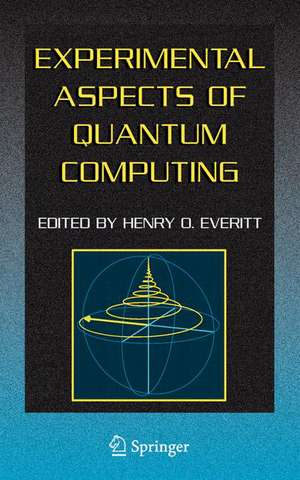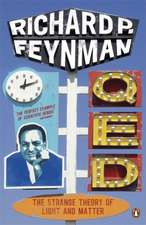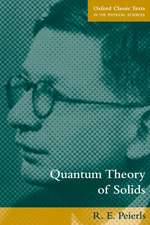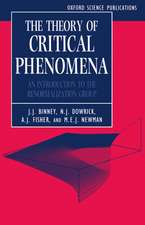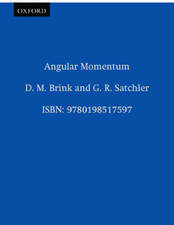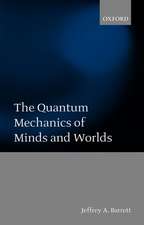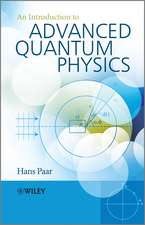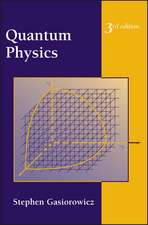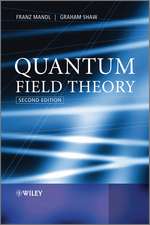Experimental Aspects of Quantum Computing
Editat de Henry O. Everitten Limba Engleză Hardback – 31 mar 2005
| Toate formatele și edițiile | Preț | Express |
|---|---|---|
| Paperback (1) | 945.30 lei 6-8 săpt. | |
| Springer Us – 28 oct 2010 | 945.30 lei 6-8 săpt. | |
| Hardback (1) | 949.23 lei 6-8 săpt. | |
| Springer Us – 31 mar 2005 | 949.23 lei 6-8 săpt. |
Preț: 949.23 lei
Preț vechi: 1157.60 lei
-18% Nou
Puncte Express: 1424
Preț estimativ în valută:
181.69€ • 197.42$ • 152.72£
181.69€ • 197.42$ • 152.72£
Carte tipărită la comandă
Livrare economică 21 aprilie-05 mai
Preluare comenzi: 021 569.72.76
Specificații
ISBN-13: 9780387230450
ISBN-10: 0387230459
Pagini: 308
Ilustrații: VI, 308 p.
Dimensiuni: 152 x 229 x 20 mm
Greutate: 0.55 kg
Ediția:2005
Editura: Springer Us
Colecția Springer
Locul publicării:New York, NY, United States
ISBN-10: 0387230459
Pagini: 308
Ilustrații: VI, 308 p.
Dimensiuni: 152 x 229 x 20 mm
Greutate: 0.55 kg
Ediția:2005
Editura: Springer Us
Colecția Springer
Locul publicării:New York, NY, United States
Public țintă
ResearchDescriere
Practical quantum computing still seems more than a decade away, and researchers have not even identified what the best physical implementation of a quantum bit will be. There is a real need in the scientific literature for a dialogue on the topic of lessons learned and looming roadblocks. This reprint from Quantum Information Processing is dedicated to the experimental aspects of quantum computing and includes articles that 1) highlight the lessons learned over the last 10 years, and 2) outline the challenges over the next 10 years. The special issue includes a series of invited articles that discuss the most promising physical implementations of quantum computing. The invited articles were to draw grand conclusions about the past and speculate about the future, not just report results from the present.
Cuprins
Invited Articles.- Progress in Quantum Algorithms.- NMR Quantum Information Processing.- Quantum Computing with Trapped Ion Hyperfine Qubits.- Ion Trap Quantum Computing with Ca+ Ions.- Quantum Information Processing in Cavity-QED.- Quantum Information Processing with Trapped Neutral Atoms.- The Road to a Silicon Quantum Computer.- Controlling Spin Qubits in Quantum Dots.- Spin-based Quantum Dot Quantum Computing in Silicon.- Optically Driven Quantum Computing Devices Based on Semiconductor Quantum Dots.- Implementing Qubits with Superconducting Integrated Circuits.- Towards Scalable Linear-Optical Quantum Computers.- Photonic Technologies for Quantum Information Processing.- Contributed Articles.- Quantum Computer Development with Single Ion Implantation.- Bang-Bang Refocusing of a Qubit Exposed to Telegraph Noise.- Quantum Computing and Information Extraction for Dynamical Quantum Systems.- One-Dimensional Continuous-Time Quantum Walks.
Textul de pe ultima copertă
Practical quantum computing still seems more than a decade away, and researchers have not even identified what the best physical implementation of a quantum bit will be. There is a real need in the scientific literature for a dialog on the topic of lessons learned and looming roadblocks. These papers, which appeared in the journal of "Quantum Information Processing" are dedicated to the experimental aspects of quantum computing These papers highlight the lessons learned over the last ten years, outline the challenges over the next ten years, and discuss the most promising physical implementations of quantum computing.
Caracteristici
Active area of research, very strong authorship
Includes supplementary material: sn.pub/extras
Includes supplementary material: sn.pub/extras
